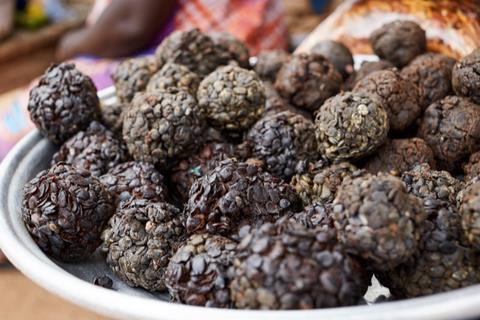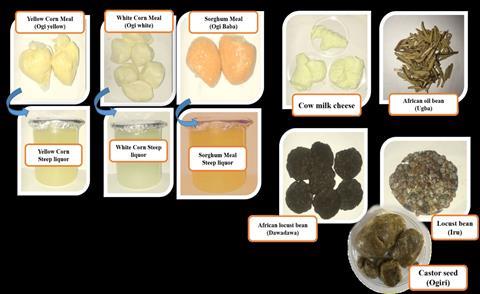Nigerian fermented foods contain a rich array of Lactobacillus species, offering the possibility of harnessing their health benefits as probiotics, a study being presented at the Letters in Applied Microbiology ECS Research Symposium this May reveals.
A team from Ladoke Akintola University of Technology tested a variety of foods, isolating and testing Lactobacillus species for their safety and probiotic potentials as well as their health benefit.

“It was discovered that various indigenous fermented foods harbour a rich diversity of Lactobacillus species, with L. plantarum and L. casei predominating. This finding sheds light on the potential probiotic strains present in these traditional foods, offering promising avenues for harnessing their health benefits thus addressing SDG3,” said Professor Oladipo Iyabo Christianah.
Fermented foods
The team sampled a variety of indigenous fermented foods, including castor seed (ogiri), white maize pap (ogi funfun), yellow maize pap, sorghum pap (ogi baba), white maize steep liquor, yellow maize steep liquor, sorghum steep liquor, African locust bean (dawadawa), African oil bean (ugba), locust bean (iru), and West African soft cheese, to isolate and characterise Lactobacillus species using molecular methods.
Nine different Lactobacillus species were identified - namely L. plantarum, L. brevis, L. casei, L. buchneri, L. lactis, L. jensenii, and L. helveticus, with L. plantarum and L. casei being the most predominant. The microbial load in different samples was assessed, showing varying colony forming unit (CFU) counts.

The probiotic potential of the isolates was evaluated, including their tolerance to bile salts and low pH, auto-aggregation, and cell hydrophobicity. The Lactobacillus species demonstrated resilience, surviving up to 1% bile and acidic pH for more than 4 hours. Additionally, their auto-aggregation and cell hydrophobicity varied, suggesting differences in adhesion capacity crucial for biofilm formation.
Safety assessment
Safety assessment was conducted through tests for hemolytic activity and antibiotic susceptibility. The isolated Lactobacillus species showed no hemolysis and were susceptible to clinically relevant antibiotics. Additionally, bacterial enzyme assays revealed amylase and protease activity in all isolates, while none exhibited keratinase and collagenase activity. Lastly, the application of probiotics was explored through the assessment of DPPH radical scavenging activity.
“Surprisingly, despite the diverse origins of the sampled indigenous fermented foods, a consistent prevalence of Lactobacillus species, particularly L. plantarum and L. casei, was observed across all samples,” Prof Oladipo said.
“This unexpected uniformity challenges previous assumptions about the microbial composition of such foods and underscores the potential widespread presence of these beneficial probiotic strains in traditional diets.
Potential probiotic strains
“This surprise discovery holds significant implications for the addressed problem of identifying potential probiotic strains from indigenous fermented foods. The unexpected prevalence of Lactobacillus species, especially L. plantarum and L. casei, highlights the rich microbial diversity inherent in these traditional food products. This newfound understanding suggests that indigenous fermented foods could serve as readily accessible and abundant sources of beneficial probiotic bacteria,” she said.
“In the real world, this discovery matters as it opens up new avenues for leveraging traditional diets to promote health and well-being. Harnessing the probiotic potential of Lactobacillus species from indigenous fermented foods offers a sustainable and culturally appropriate approach to improving gut health and immunity.
“Furthermore, it presents opportunities for developing locally sourced and economically viable probiotic products, catering to diverse populations worldwide. Overall, this surprise finding underscores the importance of exploring and preserving traditional foodways for their potential contributions to global health and nutrition.”
Building on research
The next step will be to build on the findings of this research and further explore the potential of indigenous fermented foods as sources of probiotic strains, including the extensive sampling of indigenous fermented foods from diverse geographical regions to comprehensively assess the microbial diversity and identify additional probiotic strains.
“The specific health-promoting properties and mechanisms of action of the identified Lactobacillus species can be investigated, including their ability to modulate gut microbiota, enhance immune function, and confer other beneficial effects,” Prof Oladipo said.
“Development of probiotic products derived from indigenous fermented foods can be explored, considering factors such as formulation, stability, sensory attributes and consumer acceptance.
Target populations
“Controlled clinical trials can be conducted to evaluate the efficacy and safety of probiotic products containing strains isolated from indigenous fermented foods in relevant target populations, such as individuals with gastrointestinal disorders or immune deficiencies.
“By pursuing these, we can further capitalise on the discoveries made in this study and advance our understanding of the potential health benefits offered by indigenous fermented foods and their associated probiotic strains.”
The Principal Investigator was Prof Iyabo Christianah Oladipo, working with post-graduate students Ogunsona Seun Barnabas, Ogunleke Oluwatosin Bola, Oyewumi Monsurat Motolani and Adeyemi Aminat Okikiola.
“We are grateful to the management of Ladoke Akintola University of Technology, Oyo State, Nigeria for the provision of facilities and equipment used,” she said.
The Letters in Applied Microbiology Early Career Scientist Research Symposium will be held at University of the West of England (UWE) in Bristol, UK, on 15 May 2024. To find out more, visit the event page.
Topics
- Adeyemi Aminat Okikiola
- Applied Microbiology International
- Community
- Early Career Research
- Food Security
- Gut Microbiome
- Lactobacillus
- Ladoke Akintola University of Technology
- Middle East & Africa
- Ogunleke Oluwatosin Bola
- Ogunsona Seun Barnabas
- Oladipo Iyabo Christianah
- One Health
- Oyewumi Monsurat Motolani
- Probiotics, Prebiotics & Synbiotics
- Research News







No comments yet